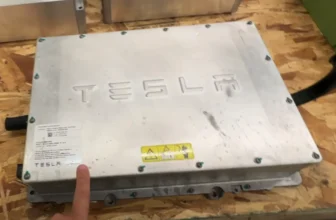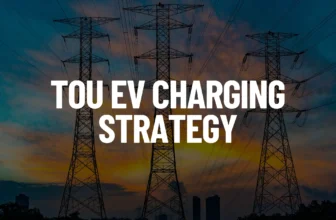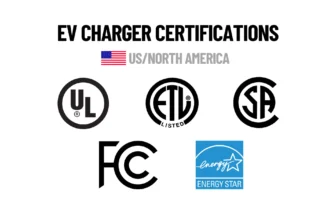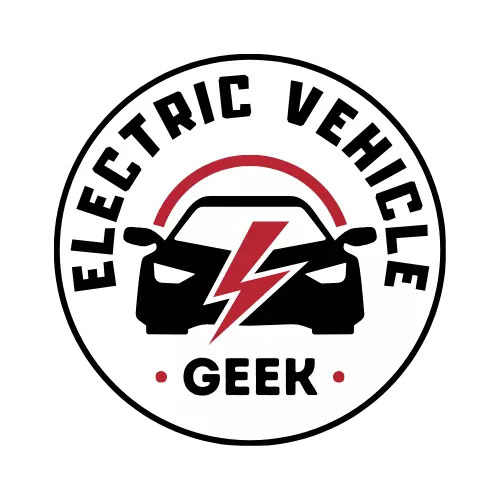Joe Biden’s administration is investing heavily in electric vehicle (EV) charging stations to transition to zero-carbon transportation and meet the government’s goals to tackle the climate crisis.
With too much funding being distributed in grants for dozens of programs across 22 states, Americans are asking, “Are EV Charging Stations Good for the Environment?” because electric vehicles are known to create emissions during the manufacturing and charging processes. However, they create fewer carbon emissions than gasoline-burning cars over their driving lifetime.
In this blog post, we will delve into the environmental benefits of EV charging stations and explore how they contribute to reducing carbon footprints and promoting sustainable transportation.
Yes, EV charging stations can be good for the environment. They reduce carbon emissions, support the use of renewable energy, improve air and noise quality, promote active lifestyles, and decrease pollution. EV charging stations can reduce reliance on fossil fuels and contribute to lower greenhouse gas emissions by using a hybrid system that incorporates smart charging and renewable energy, such as solar power. Additionally, they encourage using electric vehicles, further reducing carbon dioxide emissions and combating air pollution.
Environmental Benefits of EV Charging Stations
EV charging plays a vital role in reducing harmful Greenhouse Gases such as nitrogen oxides (NOx), particulate matter (PM), and volatile organic compounds (VOCs), which contribute to air pollution.
The availability of EV charging infrastructure helps people adopt electric vehicles, which are known to reduce air pollution by up to 30% since they produce zero tailpipe emissions and little to no carbon dioxide (CO2).
EV charging stations can further reduce the environmental impact of charging an electric vehicle using renewable energy sources such as solar, wind, hydro, and geothermal energy. Incorporating hydroelectric, solar, and wind power reduces reliance on fossil fuels and lowers carbon emissions.
EV Charging Station Using Renewable Energy
Electric vehicles (EVs) can be charged using renewable energy sources like solar, wind, and hydroelectric power which can help reduce greenhouse gas emissions and contribute to grid stability.
According to a recently published study on Electric Vehicle Technology and Its Impacts the electricity and heat sector is the largest contributor, accounting for 42% of CO2 emissions, followed by transportation at 22%.
By integrating EV charging stations with renewable energy power sources, we can reduce CO2 emissions from electricity and transportation. According to IRENA, renewable energy and electrification can reduce energy-related CO2 emissions by 75%. When combined with energy efficiency systems such as smart EV charging, renewables can reduce emissions by over 90%.
Smart Charging Environmental Benefits
By using a smart EV charger to charge an EV, EV owners can significantly lower their carbon footprints, smart charging allows EV owners to optimize their EV charging habits by reducing their plug-in periods.
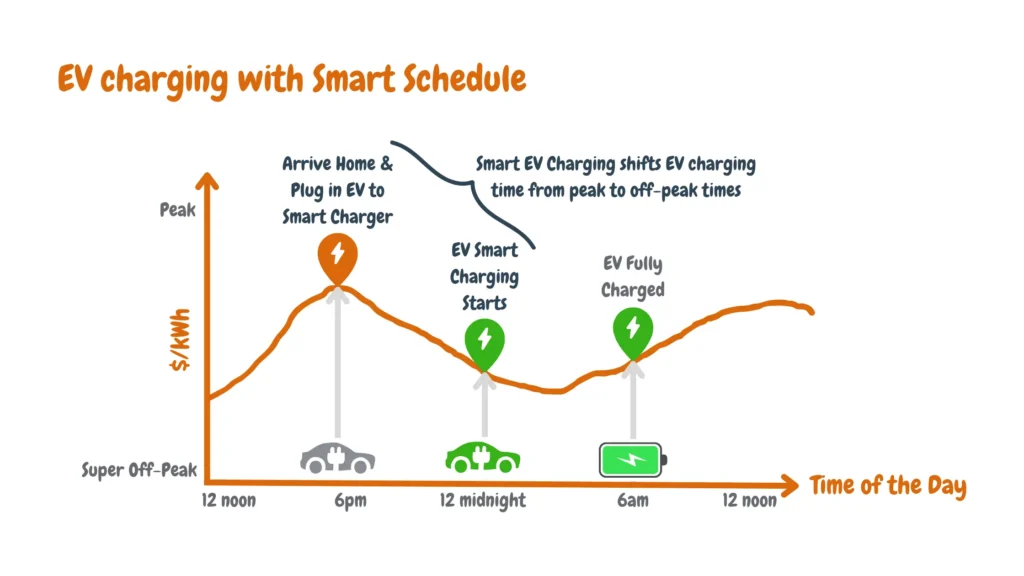
As shown in the infographic image above, we charge our vehicle during the night (off-peak sessions); we automatically program our smart EV charger to start charging at 12 midnight and automatically stop charging when the battery is full at 6 am.
Compared with passive charging, smart charging achieves around a 6% reduction in carbon emissions when used in the most common charging behaviours, characterized by overnight charging.
Smart EV charging also allows bidirectional EV Charging which offers significant environmental benefits, enhancing the integration of renewable energy by allowing electric vehicles (EVs) to store excess energy from sources like solar and wind.
This stored energy can be returned to the grid as needed, promoting a cleaner and more resilient energy system. Moreover, bidirectional charging transforms EVs into dynamic energy sources, reducing carbon emissions and optimizing grid operations.
This technology contributes to the sustainability of properties when combined with other renewable energy systems. Additionally, bidirectional charging enables powering homes directly from the vehicle’s battery, providing a practical and eco-conscious solution.
EV Charging Stations Help Conserve Natural Resources.
The environmental benefits of EV charging stations are evident in the impact on the oil and gas industry. As the growth of electric vehicles (EVs) reduces the gasoline demand, less crude oil is refined into gasoline or diesel.
President Biden’s ambitious goal of achieving 50% of new car sales as EVs by 2030 could result in a substantial 34% drop in crude oil demand in the United States.
The widespread adoption of EVs and the establishment of more charging stations contribute to a substantial decrease in the reliance on crude oil, leading to a positive environmental impact by reducing emissions and lessening the environmental footprint associated with traditional combustion engines, considering the transportation industry is leading in the use of fossil fuels.
Conclusion
In conclusion, EV charging stations offer substantial environmental benefits, from reducing greenhouse gases to promoting renewable energy sources. The use of renewable energy, coupled with smart charging strategies, further enhances the sustainability and efficiency of EV charging infrastructure.

As the world continues to transition towards electric mobility, the ecological and economic viability of EV charging stations remains crucial, requiring collaborative efforts from governments, businesses, and investors to ensure a cleaner and more sustainable.

James Ndungu is a certified EV charger installer with over five years of experience in EVSE selection, permitting, and installation. He holds advanced credentials, including certification from the Electric Vehicle Infrastructure Training Program (EVITP) and specialized training in EV charging equipment and installation, as well as diplomas in EV Technology and Engineering Fundamentals of EVs. Since 2021, James has tested dozens of EV chargers and accessories, sharing expert insights into the latest EV charging technologies.




